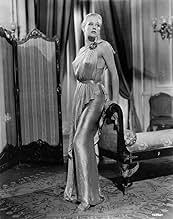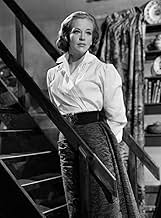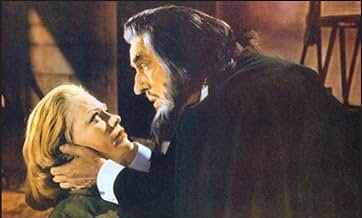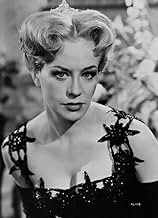Aggiungi una trama nella tua linguaThe story of a genius who hypnotizes an artist's model into becoming a great concert singer, and how she escapes from his influence only by his death.The story of a genius who hypnotizes an artist's model into becoming a great concert singer, and how she escapes from his influence only by his death.The story of a genius who hypnotizes an artist's model into becoming a great concert singer, and how she escapes from his influence only by his death.
- Regia
- Sceneggiatura
- Star
- Nominato ai 1 BAFTA Award
- 1 candidatura in totale
Hildegard Knef
- Trilby
- (as Hildegarde Neff)
Recensioni in evidenza
One of several big screen adaptations of du Maurier's TRILBY, this was notable for utilising the author's original illustrations in costume, and to some extent, settings. It also had the benefit of a characteristically flamboyant and forceful performance from the great Donald Wolfit. He's able to engender a small degree of sympathy for the grubby and boorish Svengali (including his frustration, as a classical musician, with Trilby's continual rendering of a rather wan little ditty, 'Alice, Where Art Though?' later to form the aptly dowdy signature tune to OPEN ALL HOURS). He's compelling whenever the film focuses on him, despite more than a touch of Frankie Howerd in places. Unfortunately it concentrates rather too much in the early stages on the ageing English art students, and not helped by some crude editing, the story doesn't grip as it should. Hildegarde Neff brings beauty, intelligence and a sense of vulnerability to Trilby, but she comes over as about as Irish as Elisabeth Schwarzkopf, whose sublime lyric soprano tones are heard on the soundtrack. Terence Morgan can make little impact as Billy, and despite being good to look at, with the colour and atmosphere of the early Hammer horrors, the whole enterprise is lacking in drive, with too many short scenes on cramped sets. The finale at Covent Garden where Svengali dramatically relinquishes his hold on Trilby is especially disappointingly handled, with the director failing to build any tension or sense of occasion, then allowing what remains to fall flat.
One of those films that has its moments, but falls firmly into the 'could have been so much better' category.
One of those films that has its moments, but falls firmly into the 'could have been so much better' category.
A better example of over-acting you will struggle to find in this overly theatrical adaptation of George Du Maurier's 1894 novel "Trilby". Hildegard Knef is a young, impressionable, girl who falls under the spell of the almost Rasputin-esque Donald Wolfit in the title role. He hypnotises her to rid her of pesky headaches, and give her the voice of an angel - and soon she becomes an international star of the opera. Robert Newton was originally slated for the lead, but I can't imagine he could have done better than Wolfit, who has the maniacal look (eyes, especially) and pithy dialogue down to a T. The support from Terence Morgan - as her much younger beau "Billee Bagot", Paul Rogers, David Kossoff and the truly wonderful singing of Elisabeth Schwarzkopf keep this entertaining enough, but the staging and style are just to limiting to let this version of a really menacing and evocative story soar.
This 1954 British color version of SVENGALI has always gotten the short end of the stick in my opinion. A lot of that has to do with the fact that it's always compared to the legendary 1931 version with John Barrymore but it's like comparing apples and oranges. This version has gorgeous color photography, is well lit, contains atmospheric studio sets (it looks like John Huston's MOULIN ROUGE) and it puts the emphasis back on Trilby rather than Svengali. After all TRILBY is Du Maurier's original title.
Director Noel Langley, best known for his written adaptations of THE WIZARD OF OZ and Alastair Sim's A CHRISTMAS CAROL, gets a more ensemble effect from his actors which allows for more character development from the supporting players especially Billie's artist friends. Just as in the Barrymore version, a number of liberties have been taken with the original story (though different liberties) especially the ending but remember this was England in the mid 1950s so certain allowances needed to be made. Chances are that if Barrymore's version had not been a pre-Code vehicle, made before 1934 when the Production Code began to be enforced, then the results might have been the same.
Most of the criticism regarding this version has been leveled at Hildegard Neff (actually Knef) who makes no attempt to hide her German origins when Trilby is supposed to be Irish. Although it can be disconcerting at first, the further you get into the movie the more she seems like Trilby especially after she embarks on her singing career. BTW that's Elizabeth Schwarzkopf singing for Neff in the opera scenes. Donald Wolfit, no stranger to over the top performances, actually manages to somewhat underplay his role as Svengali. The role was intended for Robert Newton who would have been WAY over the top but his drinking got him dismissed and Wolfit stepped in.
Praise should be given to VCI for making this rare film available as part of their British film series. The source print is a little soft and the colors occasionally fade at the reel changes but overall it looks very good for a public domain copy. In the end it may not measure up to the John Barrymore film but it's way better than the modern update from 1983 with Peter O'Toole and Jodie Foster. Just so you can make your own comparisons, VCI has also included a decent version of the 1931 Barrymore version on this DVD
UPDATE 2024...Sadly the VCI copy is no longer around and the movie is not available for streaming so the only way to see it is to acquire a used copy...For more reviews visit The Capsule Critic.
Director Noel Langley, best known for his written adaptations of THE WIZARD OF OZ and Alastair Sim's A CHRISTMAS CAROL, gets a more ensemble effect from his actors which allows for more character development from the supporting players especially Billie's artist friends. Just as in the Barrymore version, a number of liberties have been taken with the original story (though different liberties) especially the ending but remember this was England in the mid 1950s so certain allowances needed to be made. Chances are that if Barrymore's version had not been a pre-Code vehicle, made before 1934 when the Production Code began to be enforced, then the results might have been the same.
Most of the criticism regarding this version has been leveled at Hildegard Neff (actually Knef) who makes no attempt to hide her German origins when Trilby is supposed to be Irish. Although it can be disconcerting at first, the further you get into the movie the more she seems like Trilby especially after she embarks on her singing career. BTW that's Elizabeth Schwarzkopf singing for Neff in the opera scenes. Donald Wolfit, no stranger to over the top performances, actually manages to somewhat underplay his role as Svengali. The role was intended for Robert Newton who would have been WAY over the top but his drinking got him dismissed and Wolfit stepped in.
Praise should be given to VCI for making this rare film available as part of their British film series. The source print is a little soft and the colors occasionally fade at the reel changes but overall it looks very good for a public domain copy. In the end it may not measure up to the John Barrymore film but it's way better than the modern update from 1983 with Peter O'Toole and Jodie Foster. Just so you can make your own comparisons, VCI has also included a decent version of the 1931 Barrymore version on this DVD
UPDATE 2024...Sadly the VCI copy is no longer around and the movie is not available for streaming so the only way to see it is to acquire a used copy...For more reviews visit The Capsule Critic.
Several masterpieces have been transformed because the female lead became pregnant. A less select band emerged quite differently because the director or one of the actors fell off the wagon while the film was being made (Derek Bond, who here plays The Laird, was himself himself summoned a few years later to replace Dennis Price when he showed up legless at the start of shooting 'Wonderful Life'). Robert Newton's replacement in the title role by Donald Wolfit probably made the film duller, but Wolfit was far scarier than the charming old soak would have been.
Since Frederick Pusey's sets were based on the wise decision to base the look of the film on the original engravings (which accounts for all the authentically Victorian whiskers worn by most of the men and the false nose worn by Wolfit) it's a handsome film. Even more handsome is Hildegarde Neff (as she then was) as Trilby; who sportingly sang badly until transformed both by Svengali and the substitution of Elizabeth Schwarzkopf's voice on the soundtrack.
But just as she was too human to be convincing a couple of years earlier in the title role of 'Alraune' (in which she was created by Erich von Stroheim, no less), big strapping Knef is too robust to make a convincing Trilby.
Since Frederick Pusey's sets were based on the wise decision to base the look of the film on the original engravings (which accounts for all the authentically Victorian whiskers worn by most of the men and the false nose worn by Wolfit) it's a handsome film. Even more handsome is Hildegarde Neff (as she then was) as Trilby; who sportingly sang badly until transformed both by Svengali and the substitution of Elizabeth Schwarzkopf's voice on the soundtrack.
But just as she was too human to be convincing a couple of years earlier in the title role of 'Alraune' (in which she was created by Erich von Stroheim, no less), big strapping Knef is too robust to make a convincing Trilby.
This is quite an unusual film in that certain scenes don't make a lot of sense - storylines are clumsily and swiftly manifested with no real development and thus there is no real tension when there needs to be, however, it is visually interesting and at times beautifully lit and shot with great and believable sets.
I'm not sure if the script or the editing is at fault but think that it's some of both in equal measure that leaves the viewer at times thinking "Why was that just said?" or "Why did that character just behave like that?" or "How much time has passed between the last scene and this scene?" or "Ok, so this now appears to be the main thread of the story, why was it so long in being made apparent and why was it developed so clumsily" etc. These questions arising really put in my mind the appalling (but awfully good fun) script, and (lack of) continuity of Tommy Wiseau's "The Room".
Apart from it's script and editing/continuity reminding me of "The Room" and the storyline being reminiscient of "The Red Shoes" - possessive control-freak older man, seeks to control young woman performing against the will of her lover, - "Svengali" also reminds me of another unusual film set in Paris and made in the 1950s called "Man On The Eiffel Tower". This film is also visually interesting and nicely art-directed but also suffers from (at times) an unintelligable script and very poor continuity.
The intention of "Svengali" is of course good but poor execution of basic story-telling damages the impact of the film substantially - but I still quite liked it!
Look out for the very young and beautiful, (uncredited - even though he has some lines), great Jeremy Brett in his first feature.
I'm not sure if the script or the editing is at fault but think that it's some of both in equal measure that leaves the viewer at times thinking "Why was that just said?" or "Why did that character just behave like that?" or "How much time has passed between the last scene and this scene?" or "Ok, so this now appears to be the main thread of the story, why was it so long in being made apparent and why was it developed so clumsily" etc. These questions arising really put in my mind the appalling (but awfully good fun) script, and (lack of) continuity of Tommy Wiseau's "The Room".
Apart from it's script and editing/continuity reminding me of "The Room" and the storyline being reminiscient of "The Red Shoes" - possessive control-freak older man, seeks to control young woman performing against the will of her lover, - "Svengali" also reminds me of another unusual film set in Paris and made in the 1950s called "Man On The Eiffel Tower". This film is also visually interesting and nicely art-directed but also suffers from (at times) an unintelligable script and very poor continuity.
The intention of "Svengali" is of course good but poor execution of basic story-telling damages the impact of the film substantially - but I still quite liked it!
Look out for the very young and beautiful, (uncredited - even though he has some lines), great Jeremy Brett in his first feature.
Lo sapevi?
- QuizHildegard Knef's singing was dubbed by Elisabeth Schwarzkopf.
- Citazioni
Svengali: If you choose you can put all that nonsense behind you forever.
Trilby O'Farrall: And do what, starve?
Svengali: Not if you put your trust in me absolutely, not if you do exactly what I tell you to do.
- Curiosità sui creditiOpening credits prologue: Paris The Latin Quarter at the turn of the Century
- ConnessioniReferenced in Hilde (2009)
I più visti
Accedi per valutare e creare un elenco di titoli salvati per ottenere consigli personalizzati
Dettagli
- Data di uscita
- Paese di origine
- Lingua
- Celebre anche come
- Sihirbazın İntikamı
- Luoghi delle riprese
- Nettlefold Studios, Walton-on-Thames, Surrey, Inghilterra, Regno Unito(studio: filmed at)
- Azienda produttrice
- Vedi altri crediti dell’azienda su IMDbPro
- Tempo di esecuzione
- 1h 22min(82 min)
- Colore
- Proporzioni
- 1.37 : 1
Contribuisci a questa pagina
Suggerisci una modifica o aggiungi i contenuti mancanti



































